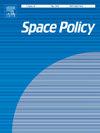Brazilian space exports and imports
IF 1.9
4区 社会学
Q2 INTERNATIONAL RELATIONS
引用次数: 0
Abstract
We analyze the role of space products in the Brazilian trade balance from the late 1990s up to 2020. We use trade balance data from Brazil and compare the performance of the space sector with the performance of the country's trade as a whole. This performance does not seem to be aligned to the country’s macroeconomic conditions, nor is a direct product of government projects in a clear and direct way. Imports seem to be a lot more important in the late 1990s than they are now, suggesting a development of the national industry. Exports are still quite irrelevant, suggesting that the country’s space companies are still not competitive enough to enter a global market. Lastly, the sector has a tendency for a negative trade balance throughout the whole period.
巴西航天进出口
我们分析了从20世纪90年代末到2020年,空间产品在巴西贸易平衡中的作用。我们使用巴西的贸易平衡数据,并将空间部门的表现与该国整体贸易的表现进行比较。这种表现似乎与该国的宏观经济状况不一致,也不是政府项目以明确和直接的方式的直接产物。在上世纪90年代末,进口似乎比现在重要得多,这表明了民族工业的发展。出口仍然无关紧要,这表明该国的航天公司仍然没有足够的竞争力进入全球市场。最后,该部门在整个时期都有贸易逆差的趋势。
本文章由计算机程序翻译,如有差异,请以英文原文为准。
求助全文
约1分钟内获得全文
求助全文
来源期刊

Space Policy
Multiple-
CiteScore
3.40
自引率
36.40%
发文量
40
期刊介绍:
Space Policy is an international, interdisciplinary journal which draws on the fields of international relations, economics, history, aerospace studies, security studies, development studies, political science and ethics to provide discussion and analysis of space activities in their political, economic, industrial, legal, cultural and social contexts. Alongside full-length papers, which are subject to a double-blind peer review system, the journal publishes opinion pieces, case studies and short reports and, in so doing, it aims to provide a forum for the exchange of ideas and opinions and a means by which authors can alert policy makers and international organizations to their views. Space Policy is also a journal of record, reproducing, in whole or part, official documents such as treaties, space agency plans or government reports relevant to the space community. Views expressed in the journal are not necessarily those of the editors or members of the editorial board.
 求助内容:
求助内容: 应助结果提醒方式:
应助结果提醒方式:


